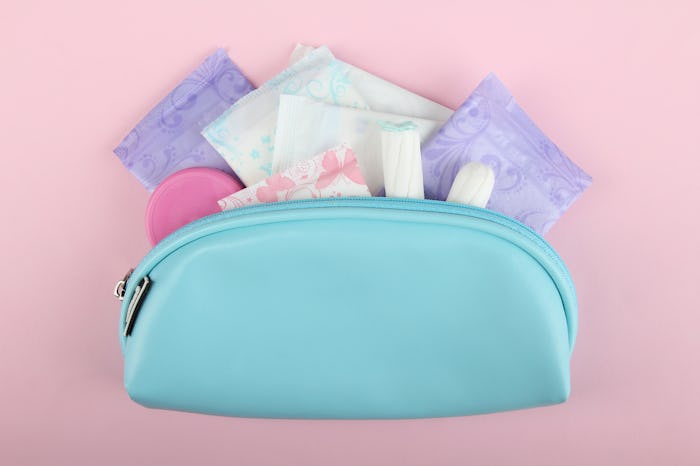Life

10 Things I Wish I Knew About My 1st Post-Baby Period
In my experience, pregnancy sucks. I mean, it's pretty badass to grow a human in your body, but it's seriously hard. From vomiting, constipation, insomnia, and pain, to receiving comments about my body from strangers, I hated pregnancy. Pretty much the best parts about my pregnancies were getting a baby at the end and not having a period for a few months. Unfortunately, when Aunt Flo comes back for her first postpartum visit, there are things I didn't expect; things I wish I knew about my postpartum period before it actually happened.
Couldn't someone have warned me? Or at least told me that even after having three babies, my first postpartum period would be different each and every time? The only things they all had in common were not knowing when they would happen, how heavy they would be, or how long they would last. They also seriously bummed me out. At first, I thought, "Oh, you again. It's been a long time since your last visit. I'd almost forgotten what you were like. Oh yeah, now I remember. FML." Then it's usually followed by something along the lines of, "Those were my favorite sheets. It's bad enough to have spit up and baby poop everywhere, did you need to add menstrual blood to the mix? Seriously." And, finally, "Why won't you end? You have overstayed your welcome. Be gone."
Somehow, talking to my body never makes it do what I want it to. Sigh. Here are just a few surprises the Aunt Flo brought with her on her first postpartum visit, because act of bringing another human being into this world is so fun and easy.
If I Would Get One At All
After my first pregnancy, I had no idea what to expect. And then, nothing. I had a birth control implant inserted at my postpartum doctor visit and literally didn't have a period for years. Score.
However, before you run out and get one, you should know that it doesn't impact everyone's cycle in same the way. In fact, when I got another implant a few months after my son was born, it didn't impact my cycle at all. Grrr.
When It Would Happen
It has been different each time. No postpartum period, 10 months postpartum, and most recently, seven weeks postpartum and just as I was recovering from my tubal ligation surgery.
How Much It Would Hurt
This last time I had my postpartum period it was seriously painful. I actually took narcotic pain medication because it was so bad.
How Heavy It Would Be
I had no idea there would be so much blood or that there would be huge clots. OMG, the clots were so huge. It was like something out of a horror film.
That I Would Leak
No pad or cup was a match for my postpartum period. That's just what every postpartum woman needs, right? More bodily fluids doing whatever the damn hell they please.
How Emotional I Would Be
For me, PMS is bad. Add postpartum depression and anxiety into the mix, and I was pretty sure my world was going to end.
What My Cycle Would Be Like After Having A Baby
Each time I've been postpartum, my menstrual cycle has been different. Before having kids, you could set a clock by or design a calendar app based on my period. After I had kids, it became a bizarre guessing game that was no fun at all. I learned to carry supplies (and spare clothes) with me.
How Long It Would Last
My "normal" cycle is about four to five days. This last time, my postpartum period lasted nine freaking days. Nine.
That I Would Forget How Bad It Is
When you don't have to deal with something for over a year, you forget what it's like and how much of a pain it is. In a way, it's nice to not remember, but then it all comes rushing (or gushing) back.
How Bummed I Would Be
It was so nice to not have to worry about being prepared, leaking, finding a bathroom, or having period sex. I was seriously bummed to have my first postpartum period. In fact, now that I'm done having babies, I sort of wish that menopause would happen. I guess that will be the next unexpected surprise my body will deliver. There's never a dull moment when you're in a body with a uterus.